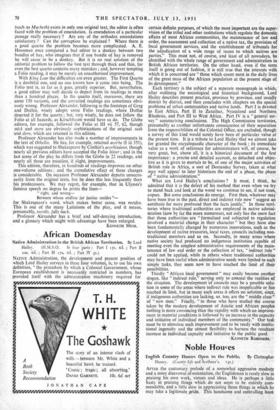African Domesday
Native Administration in the British African Territories. By Lord Hailey. (H.M.S.O. In four parts : Part I 17s. 6d. ; Part II los. 6d. ; Part HI 575., 6d. ; Part N Ss.)
NATIVE Administration, the development and present position of which Lord Halley surveys in these four volumes, is, to use his own definition, " the procedure by which a Colonial Government, whose European establishment is necessarily restricted in numbers, has provided itself with the administrative machinery required for
certain definite purposes, of which the most important are the super- vi4ion of the tribal and other institutions which regulate the domestic affairs of most African communities, the maintenance of law and order, the assessment and collection of a native tax, the provision of local government services, and the establishment of tribunals for the adjudication of a wide range of issues to which natives are parties." This must not, of course, and least of all nowadays, be identified with the whole range of government and administration in British African territories. On the other hand, even if the term itself is going out of fashion, it is still true that the interests with which it is concerned are " those which count most in the daily lives of the great mass of the African population at the present stage of its development."
Each territory is the subject of a separate monograph in which, after outlining the sociological and historical background, Lord Hailey describes present practice, province by province, and usually district by district, and then concludes with chapters on the special problems of urban communities and native lands. Part is devoted to East Africa, Part II to Zanzibar, Nyasaland and Northern Rhodesia, and Part HI to West Africa. Part IV is a " general sur- vey " summarising conclusions. The High Commission territories, presumably as another unfortunate consequence of their separation from the responsibilities of the Colonial Office, are excluded, though a survey of this kind would surely have been of particular value at- the present time. It is a tribute to Lord Hailey that we almost take for granted the encyclopaedic character of the book ; its immediate value as a work of reference for administrators will, of Course, be very great, but, above all, 1t is a historical document of the first importance: a precise and detailed account, as detached and objec- tive as it is given to mortals to be, of one of the major activities of British rule in Africa, a sort of Domesday Survey, taken at what may well appear to later historians the end of a phase, the phase of " native administration."
What are Lord Hailey's conclusions ? It must, I think, be- admitted that it is the defect of his method that even.when we try to stand back and look at -the wood we continue to see, if not trees, copses. But some conclusions do emerge. First then, whatever may have been true in the past, direct and indirect rule now suggest an antithesis far more profound than the facts justify." In those terri- tories where traditional authorities are employed in native admini- stration (now by far the more numerous), not only has the mere fact that those authorities are "formalised and subjected to regulation involved a material change in their character " but they have also been fundamentally changed by numerous innovations, such as the - development of native treasuries, local taxes, councils including non-
traditional members and so on. Secondly, in many areas where native society had produced no indigenous institution capable of meeting even the simplest administrative requirements of the main- tenance of law and order or the collection of tax, " indirect rule " could not be applied, while in others where traditional autborities may have been useful when administrative needs were limited to such simple tasks, they seem now to have reached the limit of their possibilities.
Thirdly " African local government " may easily become another
slogan, like " indirect rule," serving only to conceal the realities of the situation. The development of councils may be a possible solu- tion in some of the areas where indirect rule was inapplicable or has reached its limit, but in many such areas it offers no solution, since, if indigenous authorities are lacking, so, too, are the " middle class " of " new men." Finally, " to those who have studied the course taken by the modern development of Asiatic and African peoples nothing is more convincing than the rapidity with which -an improve- ment in material conditions is followed by an increase in-the capacity and initiative of individual members of the community." Our task must be to stimulate such improvement and to be ready with institu- tional ingenuity and the utmost flexibility to harness the resultant increase in individual capacity and initiative to the public good.
KENNETH ROBINSON.






































 Previous page
Previous page